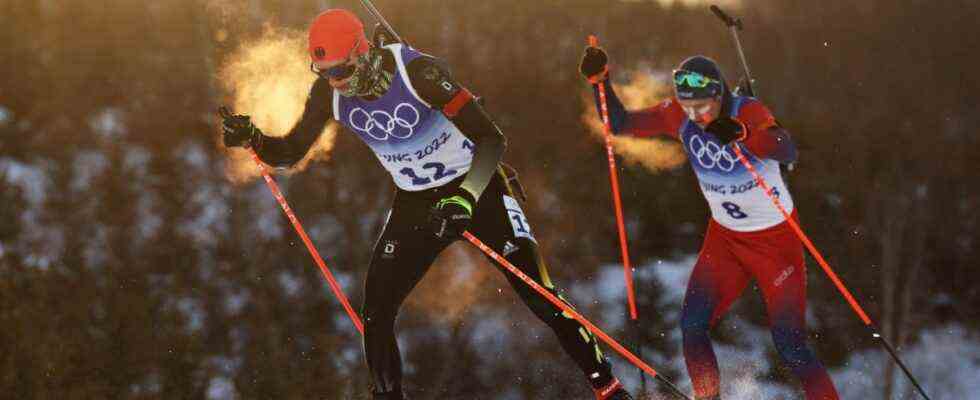Life as an Olympian ended in a rather fitting way. Before these winter games in China, Benedikt Doll had decided that he only wanted to fight for Olympic medals once more; that in the not too distant future there will be much more to his life than sport. At almost 32 years old, he doesn’t want to work another four years for a two-week showdown. On Friday evening in Zhangjiakou, he drove to the finish line at the end of the mass start, invited Chinese people clapped in the stands. In the field of vision in front of him: Norwegians who hugged – as so often. Doll set the last skating steps, rammed the sticks into the snow again, his name on the monitors, eighth place next to it. Doll wasn’t too far from the medals – as is so often the case.
But not far away is always far enough away at the Olympics, and so the German men now have to live with it: that the comparisons are made to 2010, to the games in Vancouver – even then, it was empty-handed. “It was little things that prevented the medal,” said Doll now about the performance in the Far East, “it wasn’t that we were miles away.” Of course: the one shot, just a few millimeters away, that quickly comes across as a trifle in biathlon. However, that’s exactly what it’s about. For heart surgeons, there are only a few millimeters between good and badly done.
The coarse does not make Olympic champions and the precision mechanics are the athletes of the other nations. Doll noticed that again in this mass start. It was icier than ever at minus 17 degrees, the conditions were gusty, it was anything but a feel-good race at the end in Zhangjiakou. But Doll fought his way through, until the last standing stage he was still fighting for bronze. Then he stood on the mat, risked a lot – and shot four penalties. The physical strain was high, “then a really strong wind came in, that made it almost impossible,” he said later.
However, there was one next to him. “Sure, you have to say: Christiansen behind me did it,” Doll then analyzed. Two mats beside him was Norway’s Vetle Sjaastad Christiansen, who struggled in the same conditions – and he overcame them with five goals. “Chapeau, that was anything but easy to shoot,” said Doll appreciatively.
Doll was the closest thing to a medal
National coach Mark Kirchner struggled even more with Doll’s first standing stage, since he was further up the field. “The conditions were good and he missed the fourth and fifth. He messed that up on the third shooting,” said Kirchner. Johannes Thingnes Bö managed the fourth Olympic victory ahead of Sweden’s Martin Ponsiluoma. Johannes Kühn (10th), Roman Rees (14th) and Philipp Nawrath (23rd) were further away. Shortly before these games, Doll had won the mass start in Antholz, but after a sprint success by Kühn in Hochfilzen, it was the only German victory this winter.
In fact, Doll was then the closest to a medal in China, especially in the individual, one crucial mistake was too many. The fact that in the relay with Erik Lesser, Rees and Nawrath it was only a fourth place despite a good starting position still rankled those involved on Friday. “It definitely hurts that we didn’t make it,” said Doll, “but you learn over the years with competitive sport that it’s part of it, that it’s a game in the end.” It’s not as dramatic as a heart operation.
The German women travel home satisfied with one gold and one bronze
In the German biathlon women, the performance in the mass start was quite similar, gold went to Justine Braisaz-Bouchet from France, silver to Tiril Eckhoff from Norway, behind her compatriot Marte Olsbu Röiseland took bronze – no biathlete has five medals at the Olympics before her Done. Franziska Preuß ended up in eighth place, like Denise Herrmann (13th), Vanessa Hinz (15th) and Vanessa Voigt (18th), the feeling of winning the relay medal still shaped the mood. “We can be satisfied with the team result,” said Herrmann, “we showed everyone what we’re capable of.”
Mixed season, successful Olympics: Denise Herrmann.
(Photo: Hendrik Schmidt/dpa)
After a mixed season, she would hardly have thought that she would be able to return home with gold from the individual and bronze. For Preuss, who only just made it to the Olympics after surviving an injury and corona infection, these games still found “a conciliatory end”; under different conditions she would have been a candidate for medals in the individual races. “We can go home satisfied with the gold and the bronze,” said women’s national coach Kristian Mehringer.
We are a long way from the seven badges that the entire German team received in 2018, but times are different: Without Laura Dahlmeier, Arnd Peiffer and Simon Schempp, who were all successful solo back then and have since retired . Benedikt Doll won bronze in the pursuit and relay in South Korea, so he already has something to comfort him at home. And it’s not like there are only Olympics for him. “For me, a World Cup season is also important, for me a World Championship is also important,” he said. In a year’s time in Oberhof it’s all about the next titles, “it’s just as brilliant as the Olympic Games now,” said Doll. The little things – one can already say that – will also then matter again.

